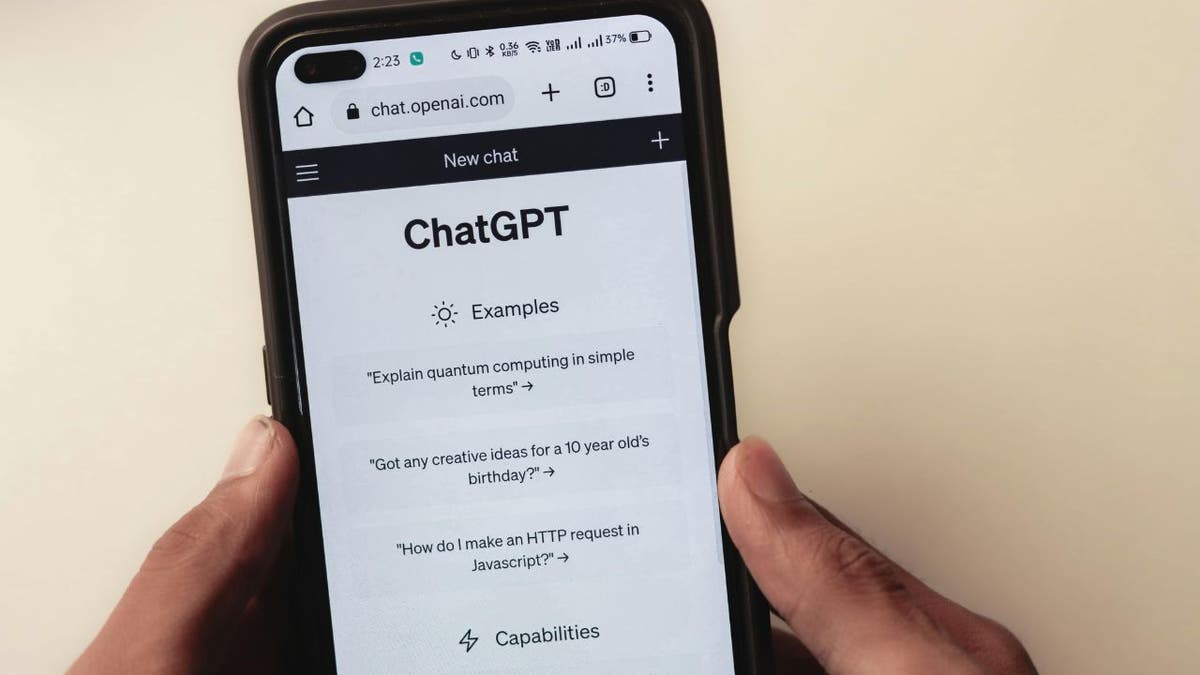Chatgpt and other models of great language (LLMS) have become amazing assistants for everyday tasks. Whether it’s complex ideas, designing a birthday card or even planning the design of your apartment, you can get stunning results with just a simple message. But, however useful these AI tools are, their comfort has hidden risks, especially when it comes to your personal privacy.
UNIV: Get my expert technology tips, critical security alerts and exclusive offers, as well as instantaneous access to my Free Survival Survival Free “ When you register!
A man using Chatgpt on his laptop (Kurt “Cyberguy” Knutsson)
How these tools work and why this matters
If you have not tried a Llm like Chatgpt before, here is the Gist: These are advanced language processors that chat with you through the text. No special orders or coding are needed, just write what you want to know or do, and they respond. For example, asking “Why is the conclave kept secret?” You will get a detailed explanation in seconds.
This simplicity is what makes the LLM so useful, but it also opens up to risks. Instead of harmless questions, someone could ask a person’s detailed profile and the model can generate a surprisingly complete report. While these tools have safeguards and often reject certain applications, sometimes smart phrasing may overlook these limits.
Unfortunately, no effort is made for someone to use Chatgpt to collect personal information about you. But do not worry, there are ways to protect -these types of digital snooping.

A person using Chatgpt on the phone (Kurt “Cyberguy” Knutsson)
Which hackers can learn about you from a data runner file
How to stop
These tools of the AI not only remove the information from the thin air. They need to access real online sources to work. That is, your data is already on the Internet; AI tools only facilitate their encounter. And if we look at the sources, most of the information you would not want to share online, such as your address, relatives, etc., is made public for people’s search sites. Other sources include social media, such as Linkedin and Facebook, as well as public databases. But none of them is as invasive as people’s search sites.
Let’s see what you can do to limit the amount of your information exposed online.

A woman using Chatgpt on her laptop (Kurt “Cyberguy” Knutsson)
Do you think you can delete your own data? Why is it harder than you think
Essential steps and precautions to protect your privacy
To effectively protect personal information from being exposed or misuse, it is important to follow these steps and adopt key precautions.
1) opt for people’s search sites one by one
Although not all people’s search sites have to offer it, most provide an option to apply for a deactivation. But that involves a few challenges.
Where to start: Identify search sites for people who expose your personal information
There are hundreds of search sites registered in the United States passing through each and every one, realistic, impossible. You will need to restrict the search in some way.
Using AI tools: How to find and list data runners with your personal data
Use the AI tools and ask them to do a deep search. It is not a perfect or complete solution; LLMs often shorten their answers to save resources. But it will give you a good starting point and, if you continue to ask for more results, you need to be able to gather a decent list of search sites for people who may have your profile.
By sending applications for deactivation: How to delete the information from people’s search sites
Now you have to go through each of these people’s search sites and send applications for deactivation. They are usually not complicated, but they definitely require time. Deactivation forms are usually at the bottom of each place, at the footer. The denomination may vary from “do not sell my” to “disabled” or something similar. Each people’s search site is a bit different. Opting all the people’s search sites on your personal information is a mammoth task. I have discussed it in more detail here. Alternatively, you can automate this process.

A woman using Chatgpt on her laptop (Kurt “Cyberguy” Knutsson)
Data removal does what VPNs do not – here is why you need both
2) Choose to use data removal services
Data removal services are in real time and energy savers when protecting your personal information online. The way these services work is simple. They send hundreds of data removal applications on your behalf to people’s search sites that you may not know they exist, but they still expose your data. And with some services, the process goes even further.
People’s search sites are not the only places to expose your personal information without your knowledge. In fact, they are just a small part of the largest data runners industry.
There are marketing, health, financial, risk and many other types of data runners who sell your information. Your data is a commodity they use for benefits, often without even realizing it.
Data removal services have taken into account the challenge of fighting this threat to your privacy. They constantly collect the web, looking for your profiles. In this way, you can only register and leave them to manage the work in the background. And here is the best part: take about 10 minutes to set up, about the same time it takes a look at a people’s search place.
- Go to a data removal service that adapts to your needs
- Choose a subscription plan
- Provide the minimum information needed so that they can effectively locate your profiles in people’s search sites
And that’s it. The removal process is fully automated and requires little or no effort on your part. With this small initial effort you can save yourself from the risks related to privacy, including scams and uniform theft. But what if your data is on display in a search site of non -covered people by any data removal service?
Each deletion service has limitations in the number of data runners that it admits. This is not a lack of effort; It is mainly that runners generally do not want to cooperate, to say it slightly. But there is a way to approach this problem without returning to manual options. The main names in the data removal industry now offer personalized removals. In simple terms, this means that you can ask them to eliminate the personal information from the websites that do not currently cover their standard plans.
The capture is that you have to do the research and point out what sites your data expose. It is not as convenient as doing it automatically, but it is a relatively smaller inconvenience for the sake of your privacy online.
View my most important options for data removal services here.
3) Take care of what you share with AI tools
Being alert to the information you provide to AI tools is the first and most crucial step to protect your privacy. Do not share sensitive details, such as your full name, home address, financial information, passwords or any other personal data that can be used to identify or harm you or others.
4) secure your AI accounts
The protection of your AI accounts of unauthorized access helps to maintain your safe interactions and data. Always use strong and unique passwords and consider the use of a password manager to generate and store these complex passwords. Activate multifactor authentication whenever possible to add an additional security layer. Regularly review your account permissions and remove access for devices or applications that no longer use. Get more details about my The best password managers reviewed by 2025 experts here.
5) Review and reinforce social media privacy
Adjusting social media privacy settings can greatly reduce the amount of personal information available to data runners. Have your profiles private, limit who can see your publications and be selective about accepting applications from friends or followers. Periodically audit the privacy settings and eliminate any unnecessary third party applications connection to further minimize your exposure.
6) Use a strong antivirus software
The protection of your devices with strong antivirus software adds an essential layer of safety against digital threats. Antivirus programs defend against malware, phishing and identity theft. Ensure -you choose good reputation software and update it regularly to keep it protected against the latest threats. Get my options for the best antivirus 2025 protection winners for your Windows, Mac, Android and iOS devices.
7) Use alias emails for online deactivation and forms
Use an email address dedicated to online deactivation and records help reduce spam and protect your main email. This practice also facilitates the monitoring of which sites and services your contact information. If your email alias is committed, you can change it quickly without interrupting your main accounts. Check out my review of the best safe and safe email services here.
Get a free Scan To know if your personal information is already on the net.
Kurt’s Key Takeaways
Large language models like Chatgpt are transforming the way we work, create and solve problems, but also introduce new risks of privacy and safety that cannot be ignored. As these tools become more powerful and accessible, each of us corresponds to proactive measures to safeguard our personal information and understand where our data could be exposed. Keeping us and using available privacy tools, we can enjoy the advantages of the AI while minimizing the risks.
Should Openai legally responsible when use its tools for collecting or exposing private data without consent? Do us know your experience or questions by writing to us Cyberguy.com/contact. Your story could help someone else keep in safety.
For more information on my technology tips and security alerts, subscribe -Free Cyberguy Report Bulletin Cyberguy.com/newsletter.
Ask a question to Kurt or to know what stories you would like to cover.
Follow Kurt on its social channels:
Answers to Cyberguy questions More tasks:
New of Kurt:
Copyright 2025 cyberguy.com. All rights reserved.
#scammers #exploit #data #Chatgpt #search
Image Source : www.foxnews.com
